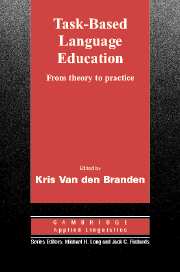Book contents
- Frontmatter
- Contents
- Acknowledgements
- Series Editors' Preface
- Chapter 1 Introduction: Task-based language teaching in a nutshell
- Chapter 2 From needs to tasks: Language learning needs in a task-based approach
- Chapter 3 Tasks for absolute beginners and beyond: Developing and sequencing tasks at basic proficiency levels
- Chapter 4 Developing language tasks for primary and secondary education
- Chapter 5 Task-based language teaching in science education and vocational training
- Chapter 6 Task-based language teaching and ICT: Developing and assessing interactive multimedia for task-based language teaching
- Chapter 7 Developing and introducing task-based language tests
- Chapter 8 The role of the teacher in task-based language teaching
- Chapter 9 A box full of feelings: Promoting infants' second language acquisition all day long
- Chapter 10 Training teachers: Task-based as well?
- References
- Subject Index
- Name Index
Series Editors' Preface
Published online by Cambridge University Press: 05 May 2010
- Frontmatter
- Contents
- Acknowledgements
- Series Editors' Preface
- Chapter 1 Introduction: Task-based language teaching in a nutshell
- Chapter 2 From needs to tasks: Language learning needs in a task-based approach
- Chapter 3 Tasks for absolute beginners and beyond: Developing and sequencing tasks at basic proficiency levels
- Chapter 4 Developing language tasks for primary and secondary education
- Chapter 5 Task-based language teaching in science education and vocational training
- Chapter 6 Task-based language teaching and ICT: Developing and assessing interactive multimedia for task-based language teaching
- Chapter 7 Developing and introducing task-based language tests
- Chapter 8 The role of the teacher in task-based language teaching
- Chapter 9 A box full of feelings: Promoting infants' second language acquisition all day long
- Chapter 10 Training teachers: Task-based as well?
- References
- Subject Index
- Name Index
Summary
While an important and immensely costly undertaking worldwide, relatively little language teaching occurs in coherently designed programmes grounded in theory and research; in most cases, what goes on in classrooms is largely determined by whichever textbook happens to have been adopted or imposed. Task-Based Language Education: From Theory to Practice provides an example of what is possible when coherent design is achieved, implemented and evaluated, and not just in a few atypical classrooms. As one of the external reviewers of the original manuscript wrote, ‘the scale and scope of this work is astonishing – this is not a small-scale, idiosyncratic, hyper-specialized “language pedagogy for the select few” that is being described; rather it is massive, mainstream, large-scale language education.’
Led by Professor Kris Van den Branden and his research team at the Centre for Language and Education at the Katholieke Universiteit Leuven, Task-Based Language Teaching (TBLT) has now been employed for roughly a decade in approximately 1,200 state schools and other educational settings throughout the Flemish-speaking region of Belgium. The settings include college-level Dutch/Flemish as a second language and international Dutch as a foreign language courses, adult vocational training, classes for immigrant children, and primary and secondary mainstream education. The Belgian achievement is especially notable because educational innovations of any sort are notoriously difficult to accomplish, and especially so when the new programme entails a radical departure from the status quo, as is the case with TBLT.
- Type
- Chapter
- Information
- Task-Based Language EducationFrom Theory to Practice, pp. ix - xPublisher: Cambridge University PressPrint publication year: 2006

